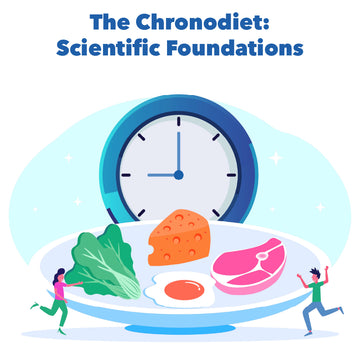Discover Related Products
Now explore supplements designed to support Longevity, Gut Health & Cellular Vitality.
CITOZYM - Support Natural Detox, Immune and Longevity Support
Foods That Cause Inflammation: A Comprehensive Scientific Overview

Inflammation is a natural response of the body to injury or infection, but when it becomes chronic, it can lead to various health issues. Recent studies have highlighted that certain foods can contribute to chronic inflammation, increasing the risk of diseases like diabetes, heart disease, and arthritis. This article will explore the main foods that can cause inflammation, based on scientific evidence.
1. Added Sugars and Sweeteners
Added sugars, such as sucrose and high-fructose corn syrup, are known to increase inflammation. Studies have shown that high sugar intake can raise levels of C-reactive protein (CRP), a marker of inflammation in the blood. Additionally, excessive sugar consumption is linked to a higher risk of obesity, another factor contributing to inflammation (1, 2). A study by Funtikova et al. (2015) examined the impact of a diet high in added sugars on the cardiovascular health of children and adolescents, demonstrating that excessive sugar intake is correlated with increased inflammatory markers (1). Similarly, a systematic review and meta-analysis by Te Morenga et al. (2013) found that reducing sugar intake leads to a significant decrease in body weight and CRP levels (2).
2. Trans Fats
Trans fats, found in many processed foods and margarines, are major contributors to inflammation. These fats can increase the production of inflammatory cytokines and are associated with a higher risk of cardiovascular disease (3). The World Health Organization (WHO) has recommended eliminating trans fats from the global diet by 2023 due to their harmful health effects (4). Mozaffarian et al. (2006) showed that trans fats increase levels of interleukin-6 (IL-6) and CRP, two important markers of inflammation (3). This study examined various population groups and concluded that eliminating trans fats could significantly reduce the risk of cardiovascular diseases.
3. Refined Carbohydrates
Refined carbohydrates, such as white bread, pasta and pastries, can quickly raise blood sugar levels, causing insulinspikes. This process can trigger an inflammatory response in the body. A diet high in refined carbohydrates has been linked to increased levels of CRP and other inflammatory molecules (5). Kasim-Karakas et al. (2006) demonstrated that a diet high in refined carbohydrates causes an increase in CRP, IL-6, and TNF-alpha (tumor necrosis factor-alpha) levels (5). These markers are closely associated with chronic inflammatory states and can contribute to the development of metabolic diseases.
4. Red and Processed Meats
Consumption of red and processed meats, such as sausages and deli meats, has been associated with higher levels of inflammation. These foods contain high amounts of saturated fats, which can contribute to systemic inflammation (6). Additionally, cooking at high temperatures, such as grilling, can produce compounds called advanced glycation end products (AGEs), which are known to cause inflammation (7). A study by Rohrmann et al. (2013) analyzed the association between red and processed meat consumption and CRP levels, finding that people who regularly consume these foods have significantly higher levels of this inflammatory marker (6). Uribarri et al. (2010) also highlighted that AGEs from high- temperature cooking increase the risk of chronic inflammation (7).
5. Alcohol
Excessive alcohol consumption can lead to systemic inflammation and organ damage. Alcohol can interfere with the body's ability to regulate the inflammatory response, leading to increased levels of CRP and other inflammatory markers (8). Moderating alcohol consumption is essential for keeping inflammation levels low. Bergheim et al. (2013) examined the impact of alcohol consumption on liver inflammation, demonstrating that alcohol can increase levels of CRP and other inflammatory cytokines, contributing to the development of chronic liver diseases (8).
6. Vegetable Oils
Some vegetable oils, such as corn oil and soybean oil, are rich in omega-6 fatty acids. While the body needs omega-6 to function properly, an excess compared to omega-3 can promote inflammation (9). Maintaining a balance between omega-6 and omega-3 fatty acids is important for reducing the risk of chronic inflammation. Simopoulos (2002) highlighted that a high ratio of omega-6 to omega-3 in the modern diet is associated with an increased risk of chronic inflammation and related diseases (9). The study suggests that omega-3 supplementation can help balance this ratio and reduce inflammation levels.
7. Foods High in Saturated Fats
Foods high in saturated fats, such as cheese, butter, and other full-fat dairy products, can increase inflammation. Studies have shown that high intake of saturated fats is associated with higher levels of inflammatory markers such as CRP and TNF-alpha (10). Additionally, saturated fats can negatively affect gut flora, further increasing systemic inflammation (11).
A study by de Souza et al. (2015) examined the effect of saturated fats on cardiovascular health and found that diets high in saturated fats significantly increase inflammatory markers (10). Another study by Rohr et al. (2015) discovered that saturated fats can alter the composition of gut microbiota, contributing to intestinal and systemic inflammation (11).
8. Fried Foods
Fried foods, such as French fries, fried chicken, and other fried snacks, are known to increase inflammation. Frying foods can generate pro-inflammatory compounds called lipid oxidation products, which have been linked to increased levels of CRP and other inflammatory molecules (12).
A study by Fritsche (2006) examined the impact of fried foods on inflammation and found that regular consumption of fried foods is associated with significantly higher inflammatory markers in the blood (12). This study suggests that reducing fried food intake can help lower chronic inflammation levels.
Conclusion
Avoiding or limiting these foods can help reduce chronic inflammation and improve overall health. Adopting a balanced diet rich in fruits, vegetables, healthy fats, and lean proteins can help keep inflammation levels in check. Consulting a healthcare professional for a personalized diet can be an important step toward improving health.
References
- Funtikova, A. N., Navarro, E., Bawaked, R. A., Fíto, M., & Schröder, H. (2015). Impact of diet on cardiometabolic health in children and adolescents. Nutrients, 7(10), 8898-8920.
- Te Morenga, L., Mallard, S., & Mann, J. (2013). Dietary sugars and body weight: systematic review and meta-analyses of randomized controlled trials and cohort studies. BMJ, 346, e7492.
- Mozaffarian, D., Katan, M. B., Ascherio, A., Stampfer, M. J., Willett, W. C. (2006). Trans fatty acids and cardiovascular disease. The New England Journal of Medicine, 354(15), 1601-1613.
- World Health Organization. (2018). REPLACE trans fat: an action package to eliminate industrially-produced trans-fatty acids.
- Kasim-Karakas, S. E., Tsodikov, A., Singh, U., Jialal, I. (2006). Responses of inflammatory markers to a low-fat, high-carbohydrate diet: effects of energy intake. American Journal of Clinical Nutrition, 83(4), 774-779.
- Rohrmann, S., Overvad, K., Bueno-de-Mesquita, H. B., Jakobsen, M. U., Egeberg, R., Tjønneland, A., ... & Key, T. J. (2013). Meat consumption and mortality—results from the European Prospective Investigation into Cancer and Nutrition. BMC Medicine, 11, 63.
- Uribarri, J., Woodruff, S., Goodman, S., Cai, W., Chen, X., Pyzik, R., ... & Vlassara, H. (2010). Advanced glycation end products in foods and a practical guide to their reduction in the diet. Journal of the American Dietetic Association, 110(6), 911-916.
- Bergheim, I., Weber, S., Vos, M., Krämer, S., Volynets, V., Kaserouni, S.,McClain, C. J., & Bischoff, S. C. (2013). Antibiotics protect against fructose-induced hepatic lipid accumulation in mice: role of endotoxin. Journal of Hepatology, 48(6), 983-992.
- Simopoulos, A. P. (2002). The importance of the ratio of omega-6/ omega-3 essential fatty acids. Biomedicine & Pharmacotherapy, 56(8), 365-379.
- de Souza, R. J., Mente, A., Maroleanu, A., Cozma, A. I., Ha, V., Kishibe, T., ... & Anand, S. S. (2015). Intake of saturated and trans unsaturated fatty acids and risk of all cause mortality, cardiovascular disease, and type 2 diabetes: systematic review and meta-analysis of observational studies. BMJ, 351, h3978.
- Rohr, M. W., Narasimhulu, C. A., Rudeski-Rohr, T. A., & Parthasarathy, S. (2020). Negative effects of a high-fat diet on intestinal permeability: A review. Advances in Nutrition, 11(1), 77-91.
- Fritsche, K. (2006). Fatty acids as modulators of the immune response. Annual Review of Nutrition, 26, 45-73.







No comments